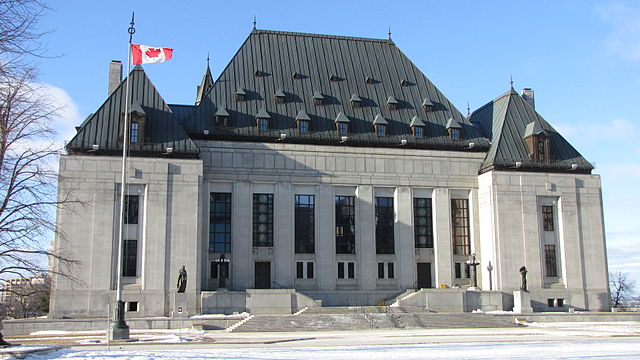When someone comes to write the history of the Harper government, he or she will have to save a chapter for the strange saga of Stephen Harper’s clumsy attempt to pack the Supreme Court of Canada with conservative-minded jurists. Or, you might say, to turn the Supremes into a choir of the right.
I am indebted to Sean Fine, the very good justice reporter at the Globe and Mail, for pulling aside the curtain that normally shields the judicial-selection process from public scrutiny. Working with sources independent of the Supreme Court — no leaks there! — Fine uncovered two crucial lists.
One was the long list, prepared by the Prime Minister’s Office and the Justice Department, of six potential candidates for a Supreme Court vacancy from Quebec. Early last summer, that list went to a five-member selection panel of parliamentarians — three Conservative MPs, one New Democrat and one Liberal. The panel did its due diligence, consulting with Chief Justice Beverley McLachlin, studying judgments written by the six jurists, and traveling to Montreal to seek the advice of leaders of the Quebec bench and bar.
The panel then trimmed the long list to a second short list of three names to be placed before the prime minister.
It was the second time in less than a year that the panel had been through this routine. The first time was relatively easy because there was a consensus choice, Justice Richard Wagner, a well-regarded, conservative-minded jurist from the Quebec Court of Appeal, and Harper appointed him.
This time, PMO/Justice, looking for someone who could be counted on to support their anti-crime agenda, were unable to find a reliable prospect among the judges of the Quebec bench or in the ranks of the province’s senior lawyers. The most impressive candidate from the Court of Appeal was Justice Marie-France Bich, a former law professor, who was valued for her strong judgments and her streak of independent thinking. But was she sufficiently conservative?
The strategists at PMO/Justice could not ignore Judge Bich. They put her on their long list, but made possible for Harper not to appoint her by loading their long list with the names of no fewer than four members of the Ottawa-based, government-friendly Federal Court of Canada. This meant that when the selection panel cut the long list of six to their short list of three, there would have to be at least one candidate from the ranks of Federal Court.
And that’s how it played out. Judge Bich made it to the short list, along with two judges from the Federal Court of Appeal. One of them was Justice Marc Nadon, an expert in maritime law. Although the prime minister is not obligated to choose from the short list, convention dictates that he should. He bypassed Judge Bich to choose the semi-retired Judge Nadon.
The Constitution guarantees Quebec three seats on the nine-member Supreme Court. The Supreme Court Act accommodates the need for expertise in Quebec civil law by setting out special qualifications for these three. It was not at all clear last summer that judges from the Federal Court were even eligible for the Supreme Court; as it turned out, they were not.
When Chief Justice McLachlin saw the long list with its names of four Federal Court judges, she anticipated the problem. Following protocol, she contacted Justice Minister Peter MacKay. She did not, as Conservative MPs have alleged, lobby against Judge Nadon. Rather, she warned MacKay that four of his six candidates might be ineligible.
What MacKay should have done was to halt the process, tell the PM that their devious court-packing scheme hadn’t worked, and advise him either to appoint Marie-France Bich (the only eligible name left on the short list) or start the selection over again (thereby leaving the Supreme Court short-handed for another year or so).
MacKay could have done that — not that his boss, Stephen Harper, would have been amused at being told it was beyond his power to make the Supremes sing right.
Cambridge resident Geoffrey Stevens, an author and former Ottawa columnist and managing editor of the Globe and Mail, teaches political science at Wilfrid Laurier University and the University of Guelph. His column appears every Monday in Waterloo Region Record and Guelph Mercury. He welcomes comments at geoffstevens[at]sympatico.ca.
Image: Wikimedia Commons



